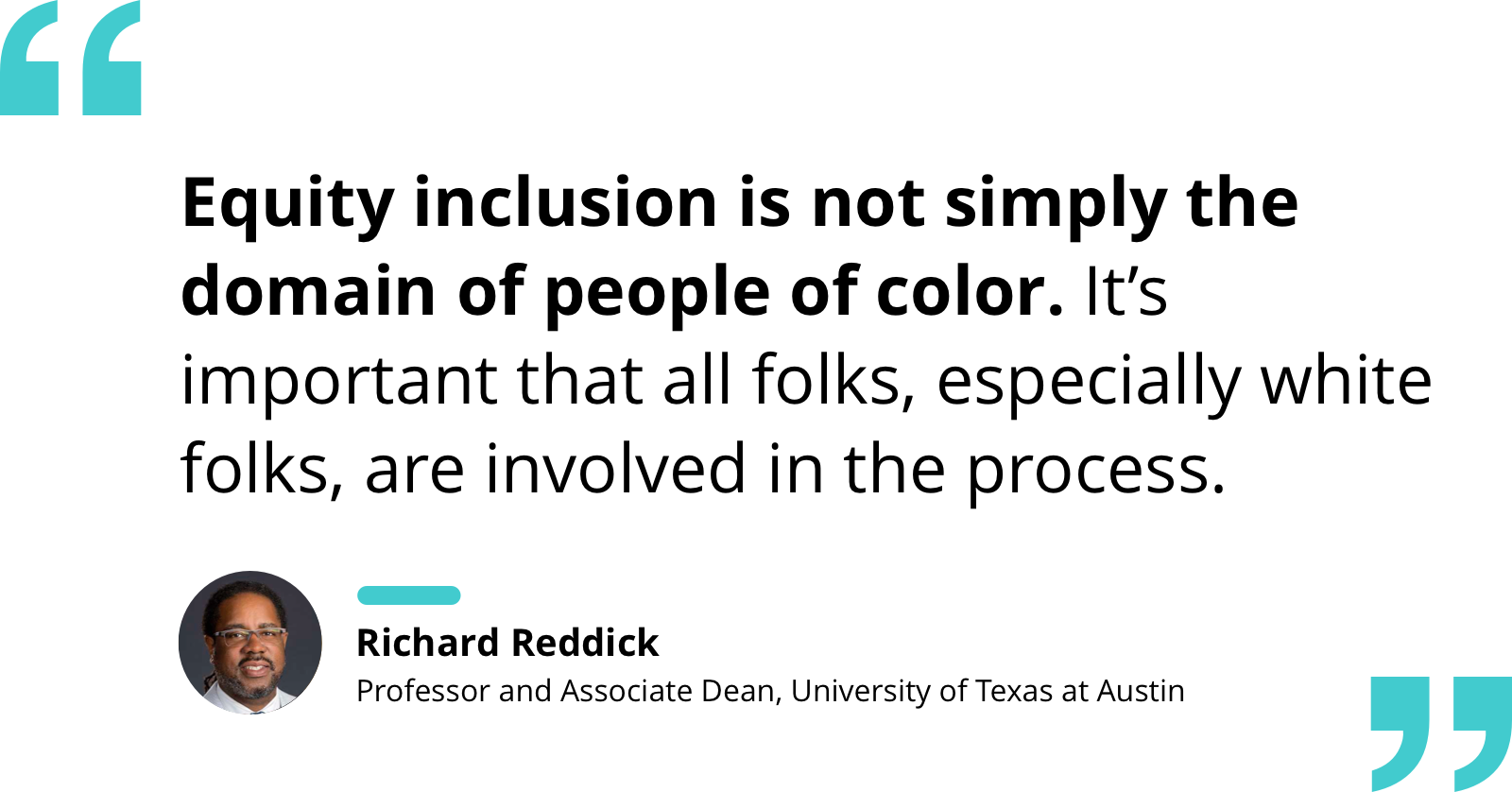Welcome to the New Year! We hope that you had a chance to relax and re-energize during winter break. As we get ready for the second half of our academic year, January is a time when most of us are looking ahead with an eye on how we can use this new beginning to do things differently...or better. At the University Innovation Alliance, we're all about offering you the resources to bring more equity and opportunity to higher education, and we've found that setting some New Year's intentions can give these aspirational goals a much-needed boost. In that spirit, we looked back over almost two years of the Innovating Together Podcast to see what wisdom higher ed leaders and innovators can offer to provide us that initial push to do things differently...or better.
Do What Inspires You
There's no question that the past two years have presented tremendous challenges for those who work in higher education. When faced with limitations like the ones imposed by a global pandemic or the uncertainties of political and social upheaval, inspiration might be one of the few things that keep us going.
"To be community engaged is to always be in conversation with the people that make it possible for me to be there and for the students, the families, the movements that give us all meaning around our presence on the campus." - Gay Theresa Johnson (Associate Professor, University of California, Los Angeles) explaining the appeal of her inspired work as a community engaged scholar
"Stay focused on what you really want to achieve as a human being among other human beings. Start with your values, and then the rest all kind of happens. Combine it with hard work and make things happen for other people." - Michael Rao (President, Virginia Commonwealth University) on drawing inspiration from the outcomes and impact of his work
"I really did get energized by taking on new challenges and have really enjoyed moving into administration and trying to figure out how to help other people be successful." - Becky Johnson (Interim President, Oregon State University) sharing what motivated her during 37 years at the institution that she now leads
Start a New Initiative
Once you're adequately inspired, the next steps are making a plan and putting it into action. Our podcast guests have proposed, initiated, and administered a vast range of impressive programs for student success and institutional betterment – far more than we can list in this space. Here are three that suggest the range of what our leaders and innovators are capable of doing.
"Equity inclusion is not simply the domain of people of color or with marginalized identities. It’s important that all folks, especially white folks, are involved in the process. So let's bring leaders into the conversation to say, 'You actually run things, you pull levers, you control budgets, address this.' We need to make this structural change in the academy." - Richard Reddick (Professor and Associate Dean, University of Texas at Austin) on proposing an allyship initiative for his academic community

"It’s about being honest that what college is now is really different than what you see on the television. The data show 75% of all American families and their students who are paying for college have to pay at least 20% of their income in order to afford a year of school – and I’m talking after financial aid. So I’d say that Real College is happening to most people." - Sara Goldrick-Rab (Professor of Sociology and Medicine, Temple University) about starting the #RealCollege initiative to acknowledge student food and housing insecurity
"Our faculty of color are now close to 35 percent of our entire faculty, in a period of three to four years, because we made this a priority in terms of our resources and engagement. Now we have an environment where it is impossible for most of our students to not walk through our college and see people who look like them across the spectrum." - Don Pope-Davis (Dean, College of Education and Human Ecology, The Ohio State University), whose Dean’s Diversity Postdoctoral Fellows Program rebuilt campus culture
Lead With Intention
Whatever career circumstances or institutional needs might initially bring someone to a position of leadership, the best leaders are more than caretakers. They shape their guiding principles and personal goals to the unique needs and potential of the institution. Those principles and goals might find expression through specific policies or initiatives, yet the intention of these leaders shapes the decisions they make, the people they hire, and how their institution is perceived from both inside and outside.
"Higher education can become a space of what I call micro-affirmations. For those four hours a day that they're in online classes, they're being called by their chosen name and their correct pronouns. And it doesn't cost anything to make sure that your employment and student-facing forms have non-binary options for gender, just as it didn't when we let people check more than one race." - Kristen Renn (Professor of Higher Education and Associate Dean, Michigan State University) on recognizing, with or without a campus climate study, how the institution affects student experiences
"If we have to pivot, let’s pivot. To go out of your way to adhere to some old rule doesn’t make any sense to me. I’ve watched universities who don’t want to bite the bullet on requirements or masking or testing, and now they’ve got cases galore. I’m thankful that we’ve had strategies to keep our cases and breakouts as close to zero as possible." - Joseph Castro (Chancellor, California State University System) on agile institutional responses to relevant COVID data
"I have had the opportunity to become a university president a couple times in the last few years, and I turned down that opportunity because I thought that I could make more of a difference in my current role. That's a rare if not unique skill set, whereas, if I were to assume the presidency, I'd be doing that maybe five percent of my time." - Tim Renick (Executive Director, National Institute for Student Success at Georgia State University) explaining why he prefers to advise universities on interventions to support students
Doing It Differently, Doing It Better
While we'd love to see everyone do what inspires them, start new initiatives, and lead with intention, there are many equally powerful, positive, and proactive ways to greet the New Year. Higher ed leaders occupy a unique position in our society as they create policy, set the tone, and shape the future of young people who attend their institutions. Whatever your course of action as the academic year picks up speed again, the University Innovation Alliance wishes you success. As always, we stand ready to offer whatever resources we can give to help you do things differently...or better!
Additional Resources
• Community engaged scholar ("Making the Case for Community Engaged Scholarship," key readings and resources from Campus Compact)
• Allyship ("Allyship – The Key To Unlocking The Power Of Diversity" by Sheree Atcheson, Forbes, 11/30/18)
• #RealCollege (an initiative by Temple University's Hope Center for College, Community, and Justice)
• Dean’s Diversity Postdoctoral Fellows Program
• Campus climate study ("What is a Climate Study? Why does it matter?" from Northeastern Illinois University's website)
• National Institute for Student Success at Georgia State University
Note: The interviews cited in this blog were drawn from the Weekly Wisdom and Scholarship to Practice Series originally aired between October 22, 2020 and November 1, 2021 as part of the University Innovation Alliance’s Innovating Together Podcast, created in partnership with Inside Higher Ed.

